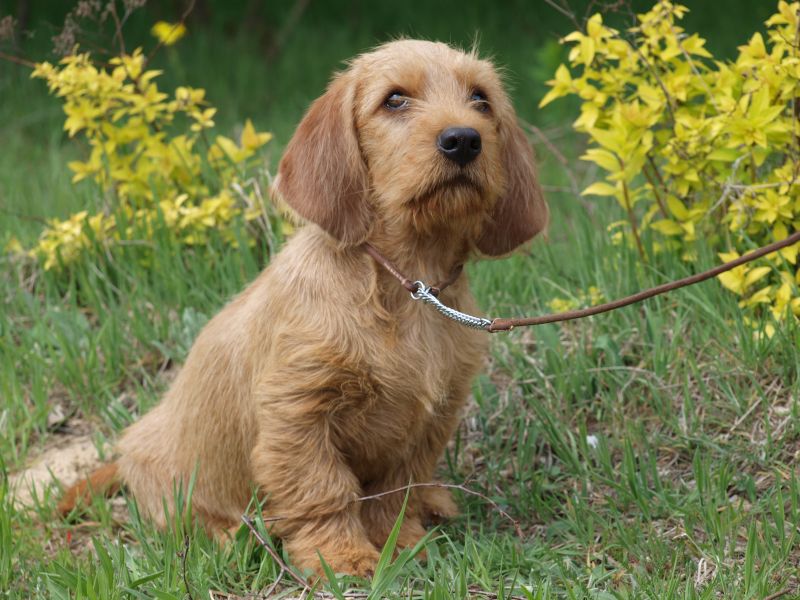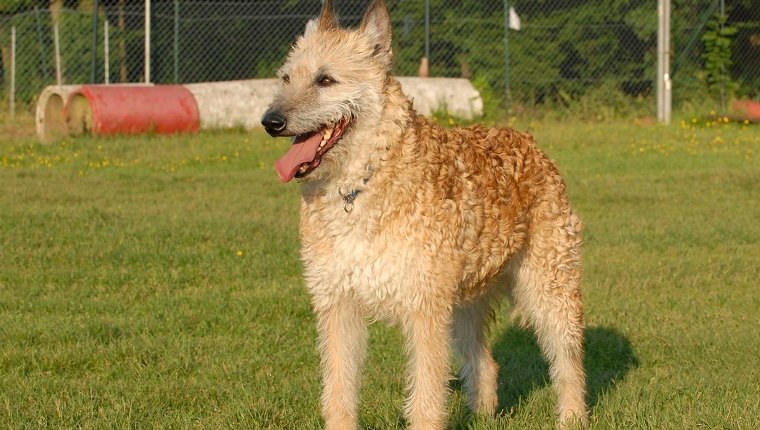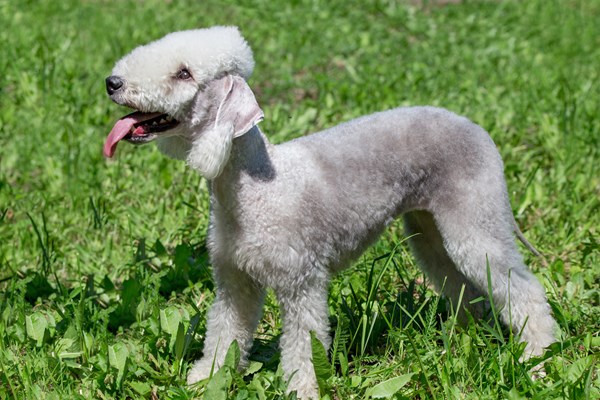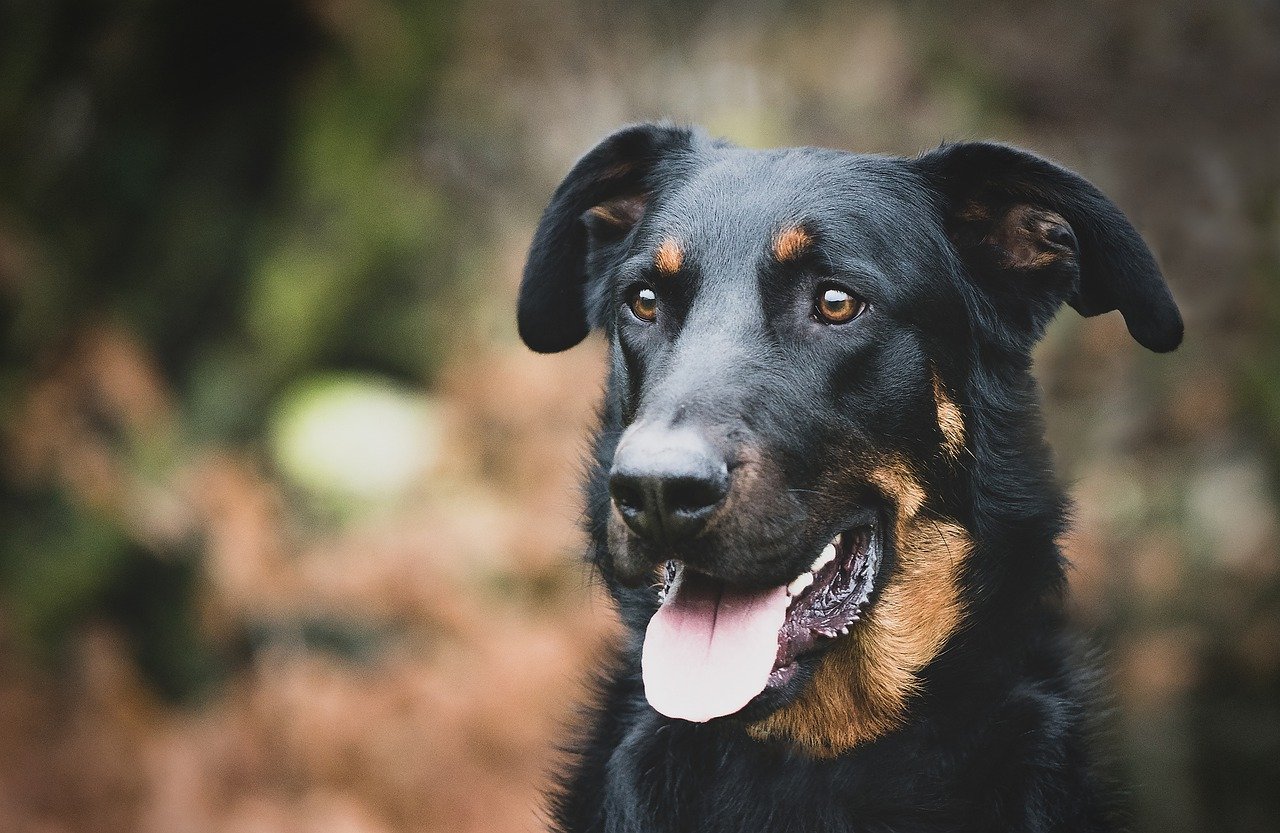Basset Fauve de Bretagne Dog Overview
The Basset Fauve de Bretagne is a French purebred dog. These puppies are smart, friendly, and active, all of which are desirable attributes in a hound dog.
Fawn Brittany Basset is another name for the Basset Fauve de Bretagne. Due to their small size, these cute pups are excellent apartment dogs, as well as fantastic companions for any household, from singles to large families with children.
However, they may chase after smaller pets or cats in the house. This is the breed for you if you want a sociable, clever dog who will keep you on your toes, be a fantastic companion, and love you completely!
Basset Fauve de Bretagne Highlights
- The Basset Fauve de Bretagne’s primary colors are fawn, wheaten, and red wheaten.
- Their fur is wiry, thick, and rough to the touch. These puppies are not suitable for anyone who is allergic to dogs, and they require a lot of grooming.
- Basset Fauve de Bretagne might be a little stubborn when it comes to training, but they react well to gentle and consistent owners who know what they’re doing.
- These dogs are normally friendly with everyone, but they will alert you if a stranger approaches the door. They are not supposed to be watchdogs, but they are hardy and will always protect their families.
- The Basset Fauve de Bretagne has a lot of energy, so they’re not likely to acquire weight unless they don’t receive enough activity. Because they are intelligent, mental stimulation is as necessary to them as physical exercise.
Basset Fauve de Bretagne Breed Features & Ratings:
Rated base on a 5 Star Scale
ENERGY LEVEL: 4 Star
EXERCISE REQUIREMENTS: 4 Star
PLAYFULNESS: 5 Star
AFFECTION LEVEL: 5 Star
FRIENDLINESS TO DOGS: 5 Star
FRIENDLINESS TO OTHER PETS: 5 Star
FRIENDLINESS TO STRANGERS: 5 Star
WATCHFULNESS: 5 Star
EASE OF TRAINING: 5 Star
GROOMING REQUIREMENTS: 5 Star
HEAT SENSITIVITY: 5 Star
VOCALITY 5 Star
Basset Fauve de Bretagne Characteristics:
- Dog Breed Group: Hound Dogs
- Height: 12 to 15 inches
- Weight: 25 to 35 pounds.
- Life Span: 12 to 15 years
- Type: Purebred
- AREA OF ORIGIN: France
- DATE OF ORIGIN: XXX
- OTHER NAMES:
- Temperament: Adaptable, Affectionate, Companionable, Courageous, Sociable, Stubborn
- Activities: XXXX
- Color: XXXX
- Litter Size: 4-6 puppies
- Puppy Prizes: $1200 – $1500 USD on average
Basset Fauve de Bretagne Health:
The Basset Fauve de Bretagne is indeed a healthy dog, and prudent breeders examine their line for health disorders like progressive retinal atrophy (PRA), epilepsy, cardiomyopathies, skin allergies, and age-related thyroid problems.
The availability of a gene test for primary open angle glaucoma means that breeders may now identify carriers and prevent developing this eye deformity. The vast majority of Fauves are extremely healthy and live to be at least 16 years old.
Working with a responsible breeder can help folks who want to own a Fauve obtain the knowledge they need about the breed’s special health concerns.
To lessen the likelihood of difficulties with their puppies, good breeders use genetic testing on their breeding canines.
Basset Fauve de Bretagne Grooming:
Basset Fauve de Bretagne coats are gritty and wiry and virtually “wash-and-wear.” The Basset Fauve de Bretagne’s primary colors are fawn, wheaten, and red wheaten.
Their fur is wiry, thick, and rough to the touch. These puppies are not suitable for anyone who suffer from allergies.
If you don’t have the time, talent, or money to care for a high-maintenance dog, the Basset Fauve de Bretagne is a good choice.
Because of their thick coats, Basset Fauve de Bretagne fare well in chilly climes. If you reside in a hotter climate, make sure you cut their hair.
Basset Fauve de Bretagne Exercise:
Basset Fauves are active and enjoy playing. Regular walks must be on a leash because they can bolt and follow their nose at any time. Exercise and play areas, such as a backyard, should also be enclosed for the same reasons.
Indoor games such as hide-and-seek, chasing a ball tossed across the floor, or teaching them new behaviors can also provide exercise.
Training and activities for dog sports such as agility, obedience, and rally can also be a terrific way to exercise your dog.
Basset Fauve de Bretagne Training:
The Basset Fauve de Bretagne is a little scent dog that was initially bred to track rabbits.
If the dog is not trained well from an early age to tune into his person, the nose will descend to the ground and dominate the brain.
Because of the intellect of this breed, mental stimulation is just as necessary as physical activity.
Basset Fauve de Bretagne Food and Nutrition:
A Basset Fauve de Bretagne diet should be designed for a little breed with a lot of energy.
If they do not get their daily activity, they will gain weight if overfed, so stay to a normal feeding schedule and do not leave food out during the day.
Limit the number of snacks they can have as well. The dietary needs of the Basset Fauve de Bretagne will alter from puppyhood to adulthood and will constantly change into their senior years, as with all dogs.
You should seek your veterinarian regarding your Basset Fauve de Bretagne’s food because there is much too much variance among individual dogs—including weight, energy, and health—to offer a specific prescription.
Basset Fauve de Bretagne Temperament and Personality:
Basset Fauve de Bretagnes are wonderful dogs for all ages. They have a lot of energy packed into such a small and strong physique.
These hound dogs enjoy being outside because they were bred to hunt with their human counterparts.
They are also extremely intelligent, and cerebral stimulation is just as necessary to them as physical activity. When it comes to training, they can be a little stubborn, but they react well to gentle and consistent owners who know what they’re doing.
They are normally friendly with everyone, but they will alert you if a stranger approaches the door. They are not supposed to be watchdogs, but they are hardy and will always protect their families.
These lovely puppies are friendly and devoted. They get along with everyone in the house but may chase after smaller pets.
Basset Fauve de Bretagne Care/Upkeep:
The owner should keep up with the Basset Fauve de Bretagne’s routine veterinary exams, just like you would with any other dog, to spot any health issues early.
Your veterinarian can assist you in developing a care routine that will keep your dog healthy.
The Basset Fauve de Bretagne has a lot of energy, so they’re not likely to acquire weight unless they don’t receive enough activity.
Ensure that your dog receives at least one decent half-hour to hour-long walk every day, with a couple nice, energetic play sessions and shorter walks thrown in for good measure.
Check their ears for debris and bugs daily and clean them as directed by your veterinarian. Cut your pet’s nails before they become too long, which should be done once or twice a month.
They shouldn’t be slamming against the floor. Your groomer can assist you with this.
Maintaining the dental health of your Basset Fauve de Bretagne will be your primary focus when it comes to their care.
Because little breeds are prone to dental problems, you should brush their teeth on a daily basis. The veterinarian can present you with how to brush your dog’s teeth properly.
Basset Fauve de Bretagne Relationship with Children and Other Pets
Because the Basset Fauve de Bretagne is a tiny to medium-sized dog breed, excessively exuberant children can easily damage them.
Though they can get along with kids of all ages, make sure your children understand how to treat smaller dog breeds gently.
The Basset Fauve de Bretagne can be a terrific active companion for younger children who learn how to properly greet and play with a little dog at a young age.
When it comes to other pets, the Basset Fauve de Bretagne can get along with other animals if they are introduced carefully and calmly, and early socialization will assist. It’s great if they get acquainted with different pets as soon as possible.
However, the Basset Fauve de Bretagne aren’t naturally fond of other animals and may want to be the only pet in the home.
Despite this, many Basset Fauve de Bretagne get along very fine with other dogs and cats, so it all comes down to training, socialization, and luck of the draw.
Basset Fauve de Bretagne Names
| Rank | Boy Names | Girl Names |
| 01 | Buddy | Molly |
| 02 | Cooper | Bella |
| 03 | Beau | Ginger |
| 04 | Jack | Luna |
| 05 | Tucker | Angel |
| 06 | Shadow | Lulu |
| 07 | Oliver | Zoey |
| 08 | Moose | Stella |
| 09 | Jasper | Shelby |
| 10 | Romeo | Holly |
All About Basset Fauve de Bretagne
These puppies are intelligent, friendly, and active, all of which are desirable characteristics in a hound dog.
The Fawn Brittany Basset is another name for the Basset Fauve de Bretagne. If you like to take one of these gorgeous dogs into your house and family, look into breed-specific rescues or your local shelter.
Because of their small size, these cute puppies make excellent apartment dogs. They also make excellent companions for every family type, from singles to large families with children.
They may, however, pursue smaller animals or cats in the house. If you want a pleasant, clever dog who will keep you on your toes, be a fantastic companion, and unconditionally adore you, this is the breed for you!
Basset Fauve de Bretagne History:
The Basset Fauve de Bretagne was developed in France from remains of the now-extinct Grand Fauve de Bretagne, a much larger breed. In early France, dogs of this newer strain were used as hunting dogs.
Following the French Revolution, commoners adopted this dog breed to assist them in hunting.
Because they hunted on foot, they required a slower dog that could track and hunt animals while also moving quickly enough for people to keep up with them.
The Basset Fauve de Bretagne is an outstanding breed. Consider adopting one of these rare pups if you wish to bring one home.
Check your local shelters, look for Basset Fauve de Bretagne rescues in your region, or breed-specific hound rescues, as these dog breeds are sometimes taken in and found permanent homes.
Where to Adopt Basset Fauve de Bretagne:
Because the Basset Fauve de Bretagne is a somewhat rare breed, it may be difficult to find a breed-specific rescue.
However, you can always check with your local shelter, and you may want to try a rescue that caters to all types of dogs. You can take a look at the following:
More Dog Breeds and Further Research:
There are many possible dog breeds to choose from, and with a little research, you can be confident that you’ll select the perfect dog to bring home.
Consider the following hound breeds if you want to learn more about different dogs:
Basset Fauve de Bretagne Fun Facts:
- The Basset Fauve de Bretagne is a purebred dog from France.
- These pups are intelligent, friendly, and active, which are great qualities for a hound dog.
- The Basset Fauve de Bretagne also goes by the name Fawn Brittany Basset.
Frequently Asked Questions (FAQs):
Because this breed is a scent hound, it may walk away or ignore you in order to track a scent. When outside, keep your Bretagne on a leash or in a secure place. Despite their diminutive size, these dogs require activity.
You can take them to a park for advanced training, but put them on a leash so they don’t run off.
Basset Fauve de Bretagnes are wonderful dogs for all ages. They have a lot of energy packed into such a small and strong physique.




